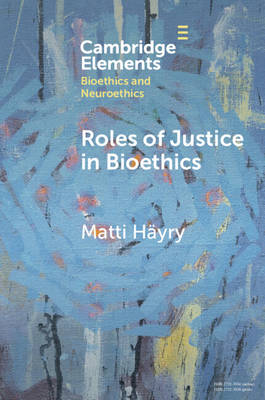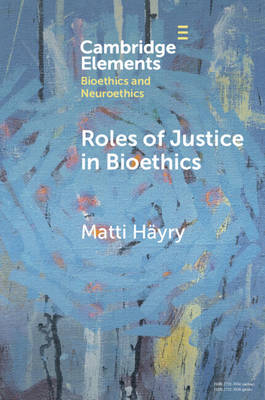
Bedankt voor het vertrouwen het afgelopen jaar! Om jou te bedanken bieden we GRATIS verzending (in België) aan op alles gedurende de hele maand januari.
- Afhalen na 1 uur in een winkel met voorraad
- In januari gratis thuislevering in België
- Ruim aanbod met 7 miljoen producten
Bedankt voor het vertrouwen het afgelopen jaar! Om jou te bedanken bieden we GRATIS verzending (in België) aan op alles gedurende de hele maand januari.
- Afhalen na 1 uur in een winkel met voorraad
- In januari gratis thuislevering in België
- Ruim aanbod met 7 miljoen producten
Zoeken
Omschrijving
This Element traces the origins and development of bioethics, the principles and values involved in the discipline, and the roles of justice among these principles and values. The main tasks given to the concept of justice have since the late 1970s been nondiscrimination in research, prioritization in medical practice, and redistribution in healthcare. The Element argues that in a world challenged by planet-wide political and environmental threats this is not sufficient. The nature and meaning of justice has to be rethought. The Element does this by dissecting current bioethical approaches in the light of theories of justice as partly clashing interpretations of equality. The overall findings are twofold. Seen against the background of global concerns, justice in bioethics has become a silent guardian of economic sustainability. Seen against the same background, we should set our aims higher. Justice can, and must, be put to better use than it presently is. This title is also available as Open Access on Cambridge Core.
Specificaties
Betrokkenen
- Auteur(s):
- Uitgeverij:
Inhoud
- Aantal bladzijden:
- 88
- Taal:
- Engels
- Reeks:
Eigenschappen
- Productcode (EAN):
- 9781009108478
- Verschijningsdatum:
- 11/08/2022
- Uitvoering:
- Paperback
- Formaat:
- Trade paperback (VS)
- Afmetingen:
- 152 mm x 229 mm
- Gewicht:
- 127 g

Alleen bij Standaard Boekhandel
+ 66 punten op je klantenkaart van Standaard Boekhandel
Beoordelingen
We publiceren alleen reviews die voldoen aan de voorwaarden voor reviews. Bekijk onze voorwaarden voor reviews.









